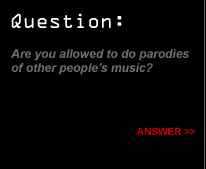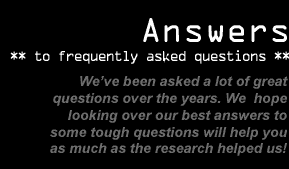|
Are ApologetiX songs parodies or just rewrites?
According to Webster's dictionary, a parody is "A literary composition in which the form and expression of serious writings are closely imitated but adapted to a ridiculous subject or a humorous method of treatment; a burlesque imitation of a serious poem."
Please note that we do closely imitate literary compositions and adapt them to a subject that seems to the world to be ridiculous. Of course, to the members of ApologetiX, that subject matter is not ridiculous. However, we are well aware when we perform these parodies, that the world sees the mix of secular rock and roll (primarily hedonistic) mixed with religion as ridiculous. Also, many of our parodies are indeed humorous, and even ones that I didn't intend to be humorous, are humorous to some audiences, because there is something inherently funny in a rock song being used for religious purposes.
Now, back to the second part of that parody definition ... "a burlesque imitation of a serious poem."
Burlesque is defined by the same dictionary as "Tending to excite laughter by ludicrous images, or by a contrast between the subject and the manner of treating it."
We're sure you'll agree that there is a strong contrast between the subject (religious matters — we hate the word religious, but that's how the world classifies it, and they're the ones who judge parody) and the manner of treatment (serious rock and roll songs). Prime example: The idea of using an Eminem-type song for an altar call, as we did in "The Real Slim Shady." That is a ludicrous image to the majority of the population. Of course, that song also comments on the original in a number of ways, and also parallels the original's theme, in which Eminem keeps asking for "The Real Slim Shady" to please stand up, whereas ApologetiX is also asking for the listeners to "please stand up" and accept Christ.
Just so you know, here's how the U.S. Supreme Court defined parody in their landmark ruling that opened the door for what we do:
"The germ of parody lies in the definition of the Greek parodeia, quoted in Judge Nelson's Court of Appeals dissent, as 'a song sung alongside another.' 972 F. 2d, at 1440, quoting 7 Encyclopedia Britannica 768 (15th ed. 1975). Modern dictionaries accordingly describe a parody as a "literary or artistic work that imitates the characteristic style of an author or a work for comic effect or ridicule," [n.12] or as a "composition in prose or verse in which the characteristic turns of thought and phrase in an author or class of authors are imitated in such a way as to make them appear ridiculous." [n.13] For the purposes of copyright law, the nub of the definitions, and the heart of any parodist's claim to quote from existing material, is the use of some elements of a prior author's composition to create a new one that, at least in part, comments on that author's works. See, e. g., Fisher v. Dees, supra, at 437; MCA, Inc. v. Wilson, 677 F. 2d 180, 185 (CA2 1981). If, on the contrary, the commentary has no critical bearing on the substance or style of the original composition, which the alleged infringer merely uses to get attention or to avoid the drudgery in working up something fresh, the claim to fairness in borrowing from another's work diminishes accordingly (if it does not vanish), and other factors, like the extent of its commerciality, loom larger. [n.14] Parody needs to mimic an original to make its point, and so has some claim to use the creation of its victim's (or collective victims') imagination, whereas satire can stand on its own two feet and so requires justification for the very act of borrowing."
Note that the word parody actually comes from the Greek for "a song sung alongside each other." Please also note that the parody can either be making a commentary on the substance or the style of the original.
We would not say what that we do are simply rewrites. We see rewrites more as somebody taking the melody for a pop song and writing their own words that don't mimic the original's rhyme scheme and structure. Our songs closely match the rhyme scheme of the original -- not just the last words of a sentence, but internal wording -- commenting often on the substance and always on the style, showing that we are in effect poking fun at the original work, whether we do so with a serious subject matter or not.
In effect, at the bottom of every ApologetiX song, there is this message: "You know, with a few modifications, almost anything, even profane things, can be used to glorify God." It's like Balaam's donkey talking in the story told in Numbers 22-24; God sometimes has a humorous way of delivering the message (Now, you know that God surely realized that the world would find that story funny as it was passed down through the ages), but that doesn't make the message any less true.
Although we are dead serious about our message, we are presenting it in a humorous way. You know, Jesus presented truths of the Gospel, including the message of salvation and the finality of judgment, with parables — some of them very amusing when you look into the context of the society in which they were presented — and it must have seemed to the religious establishment of his day as almost profane to take such glorious religious principles and lower them to the status of word-picture stories that even the common people could understand. But Jesus knew that the medium was effective. And that's why we do what we do.
|




